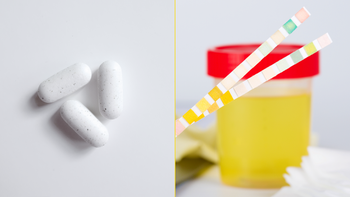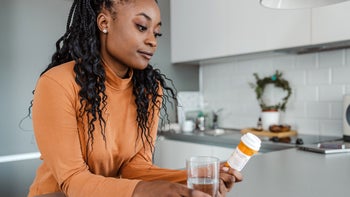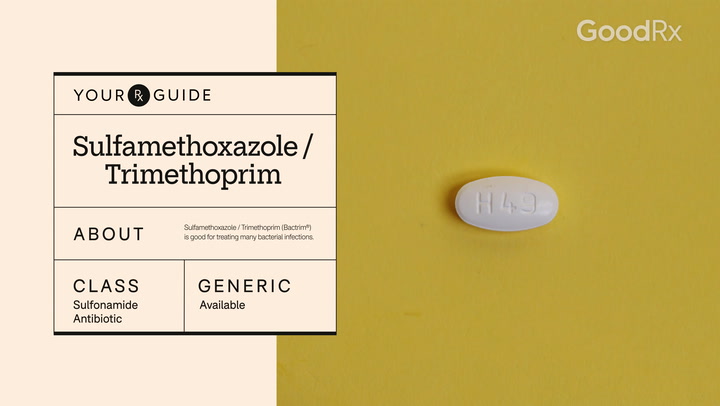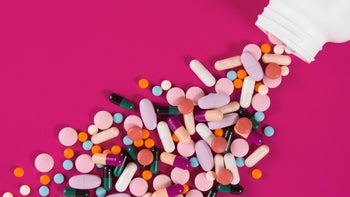
Can I Drink Alcohol With Sulfa Antibiotics Like Bactrim?
Key takeaways:
You shouldn’t mix Bactrim (sulfamethoxazole / trimethoprim) and alcohol. Combining them could cause side effects like nausea and vomiting, flushing, and a fast heartbeat.
Bactrim interferes with how your liver breaks down alcohol. This makes it harder for your body to get rid of alcohol.
Wait at least 48 hours (2 days) after your last dose of Bactrim before you enjoy any alcoholic beverages.
Some topical sulfa antibiotics are safer to use while drinking alcohol. But these medications typically treat different infections than Bactrim, so they’re not a direct substitute.
Access savings on related medications

Many of us enjoy alcoholic drinks from time to time. But they don't always mix well with certain medications. Bactrim (sulfamethoxazole / trimethoprim), a sulfa antibiotic used to treat bacterial infections, is a case in point.
The combination can worsen side effects you’re likely to encounter. And in some cases, serious side effects have been reported.
Here, we’ll dive into the interaction between alcohol and Bactrim. If you have a prescription for this antibiotic, it’s important to know how to stay safe and lower your risk of side effects.
Search and compare options
Can I take Bactrim with alcohol?
No. It’s best to avoid alcohol if you’re taking Bactrim. The combination can worsen side effects and make it harder to recover from the illness you’re taking Bactrim for.
It’s also possible that combining alcohol and Bactrim can lead to a more serious interaction, called a disulfiram-like reaction. But the research on this isn’t straightforward. Some studies show that alcohol can lead to serious problems for people taking Bactrim. Other research suggests that the mixture doesn’t really cause any serious issues.
Because the studies aren’t conclusive, and since alcohol can have adverse effects on infections, most healthcare providers err on the side of caution. They’ll recommend that you steer clear of the combination.
Is having one or two drinks OK?
No. It’s best to avoid alcohol altogether, if possible.
Healthcare providers caution against consuming any amount of alcohol while taking Bactrim. This is due to the risk of potentially dangerous side effects associated with the combination. Completely avoiding alcohol while taking Bactrim lowers your risk of side effects. Mocktails and other non-alcoholic alternatives are safer choices.
How does alcohol interact with Bactrim?
Bactrim can block your liver’s ability to break down alcohol, making it harder for your body to clear alcohol from your system. This may cause what’s called a “disulfiram-like reaction.” You may experience several moderate-to-severe side effects, including sweating, nausea and vomiting, and flushing. You could also experience low blood pressure or a fast heartbeat.
On its own, alcohol can lead to nausea, vomiting, and diarrhea — especially when consumed in large or rapid quantities. Bactrim can cause similar side effects. So mixing alcohol with Bactrim can also worsen these symptoms.
Drinking alcohol with Bactrim can also make it harder to recover from illness. Alcohol weakens the immune system, making it harder for your body to fight an infection. This is especially true with chronic or heavy alcohol consumption. Heavy drinking is defined as the consumption of over 8 drinks per week for women and more than 15 drinks per week for men.
Are there any more serious side effects or risks to consider?
Yes. Disulfiram-like reactions can sometimes cause side effects like chest pain, difficulty breathing, and heart rhythm problems.
Bactrim also has some risks, regardless of whether you’re drinking alcohol while taking it. However, they’re rare and typically go away after stopping it.
More serious side effects of Bactrim include:
Watery or bloody diarrhea
Unusual bruising or bleeding
Blistering or peeling skin
Heart palpitations
Swelling of the face, lips, or tongue
Chest pain
Trouble breathing
If you experience any serious side effects like these while taking Bactrim, seek medical help right away.
When can I start drinking after taking Bactrim?
You should try to wait at least 48 hours (2 days) after your last dose of Bactrim before drinking alcohol. That’s how long it takes the average person’s body to clear Bactrim after a dose. But it could take longer for older adults or people with kidney problems.
Because the timeframe can vary, ask your healthcare provider about when it’s safe to drink after you’ve finished your Bactrim prescription.
Important: Don’t stop taking Bactrim just to drink alcohol. Make sure to finish taking all of your prescribed doses. Stopping it too early can lead to an undertreated infection that could return or become resistant to antibiotics in the future.
Are there are any sulfa antibiotics that aren’t affected by alcohol?
Compared to Bactrim, some sulfa antibiotics are safer to pair with alcohol. They include topical creams like silver sulfadiazine (Silvadene) and eye drops like sulfacetamide (Bleph-10). But these medications generally treat different infections than oral Bactrim. They’re not exactly a direct swap.
Topical antibiotics are safer because less of the medication is absorbed into your bloodstream, and there’s less risk of them interacting with alcohol. They tend to mostly just affect your skin, eyes, or wherever you’re applying them.
Keep in mind: Alcohol by itself can worsen liver problems and symptoms of other health conditions, even if it doesn’t interact with your medication. Always ask your healthcare provider if it’s safe for you to drink alcohol — especially while you’re sick.
The bottom line
You shouldn’t combine sulfa antibiotics like Bactrim (sulfamethoxazole / trimethoprim) and alcohol. The combination can worsen their side effects, and there’s a potential risk for disulfiram-like reactions. Alcohol can also make it harder to recover from illness. It’s advisable to wait at least 48 hours (2 days) after your final dose of Bactrim before drinking alcohol.
Why trust our experts?



References
Centers for Disease Control and Prevention. (2022). Excessive alcohol use.
Maideen, N. M. P. (2019). Clinically important and pharmacologically relevant drug interactions with alcohol. American Journal of Research in Medical Sciences.
Mergenhagen, K. A., et al. (2020). Fact versus fiction: A review of the evidence behind alcohol and antibiotic interactions. Antimicrobial Agents and Chemotherapy.
National Institute on Alcohol Abuse and Alcoholism. (n.d.). Alcohol's effects on the body.
Proficient Rx LP. (2023). Sulfamethoxazole and trimethoprim tablet [package insert]. DailyMed.
Substance Abuse and Mental Health Services Administration. (2009). Chapter 3 — disulfiram. Incorporating Alcohol Pharmacotherapies Into Medical Practice.
Substance Abuse and Mental Health Services Administration. (2009). Exhibit 3-2 possible effects of the disulfiram-alcohol reaction. Incorporating Alcohol Pharmacotherapies Into Medical Practice.
Was this page helpful?
Related Articles
Browse medications
View AllResearch prescriptions and over-the-counter medications from A to Z, compare drug prices, and start saving.



























